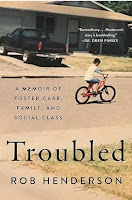Friday, February 7, 2025
Good Dirt by Charmaine Wilkerson
Saturday, April 27, 2024
The Secret Lives of Booksellers and Librarians
Tuesday, March 26, 2024
A Great Country by Shilpi Somaya Gowda
Tuesday, February 20, 2024
Troubled by Rob Henderson
Tuesday, January 23, 2024
Safe by Mark Daley
Saturday, May 13, 2023
Rising Class and It.Goes. So. Fast
RISING CLASS by Jennifer Miller profiles “How Three First-Generation College Students Conquered Their First Year.” The names of these real life students are Briani, Conner, and Jacklynn and the first two attend Columbia University in New York while Jacklynn attends Ozark Technical Community College. Briani is from a small town in Georgia and Conner and Jacklynn, a long-time couple, are from Missouri. By sharing details about issues like financial strains and family addiction, Miller poignantly points out “the gulf between … [first generation] and so many other students. They all lived on the same campus, but they didn’t live in the same world.” Professional reviews suggested this text for students in high school (ages 12 to 18 or in grades 10 -12), but I am honestly not sure how much they could relate since they have not yet been to college. However, they could definitely learn from these experiences and perhaps better formulate questions and criteria related to their own future college choices. Educators, too, could benefit from reflecting upon these students’ concerns and Miller’s extensive reporting. Brookings published a report (8/21) on transition programs between high school and college which outlines their mixed success in preparing students. And Miller notes that in Fall 2019, “roughly a third of college students in the United States were first-generation.” Given more recent mental health crises, it is clear that even more support is needed.
A related text, told from a parent’s perspective, is IT. GOES. SO. FAST by Mary Louise Kelly, an accomplished journalist and cohost of NPR’s All Things Considered. She subtitles her non-fiction text “The Year of No Do-Overs” and appeared last month on the PBS NewsHour Bookshelf to discuss this memoir. Kelly reflects on balancing work and motherhood, particularly during the year when her oldest son is a senior in high school and about to dramatically change family dynamics. While Kelly’s stories (e.g., simultaneously getting on a helicopter in Baghdad while taking a call from the school nurse about her younger son being ill) may be more dramatic than what most parents face, the conflict between work and family will certainly be familiar and readers will find Kelly’s writing to be engaging. IT. GOES. SO. FAST received starred reviews from Booklist and Publishers Weekly.
Although this text
centered on older, high school age children, childcare – availability, quality,
cost – in America and around the world (particularly due to COVID’s impact) continues
to be a major issue and deserves more attention. The World Economic Forum published this report about a year ago and looks
at the gender gap in pay as well as the “motherhood penalty.” Pew Research also recently (5/23) complied some perspective on motherhood.
Monday, April 3, 2023
Coming of age stories by Aleman and Berg
In EARTH'S THE RIGHT PLACE FOR LOVE
Elizabeth Berg offers a prequel to The
Story of Arthur Truluv, sharing Arthur’s coming of age story as a
teenager in 1947 Mason, Missouri. The story reflects Berg’s typically gentle,
heartwarming writing style, but there is not much action. Arthur falls in love
and deals with several family situations, particularly his relationship with his
older brother, Frank. Praised by authors like Adriana Trigiani (Big Stone Gap), Rachel Joyce (Miss Benson’s Beetle), and Debbie Macomber, EARTH'S
THE RIGHT PLACE FOR LOVE is sure to
please loyal Berg readers who will enjoy this relatively short novel with its
small town setting and homespun feel.
Welcome to Continuing the Conversation!
We are in the midst of migrating book reviews to this new blog. To see past reveiws and comments, please visit Book Talk ... A Conversation...
-
I CHEERFULLY REFUSE by Leif Enger has a beautiful, eye-catching cover which reflects the many layers involved in this latest story from an ...
-
GROUNDS FOR MURDER by Betty Ternier Daniels is a debut mystery in the Jeannie Wolfert-Lang series. I am grateful for the free preview copy ...
-
THE ENGLISH MASTERPIECE by Katherine Reay is described by the publisher as “perfect for fans of Kate Quinn and Ariel Lawhon .” Given that ...











